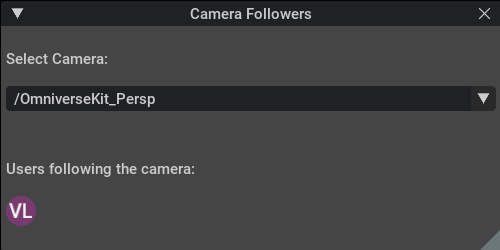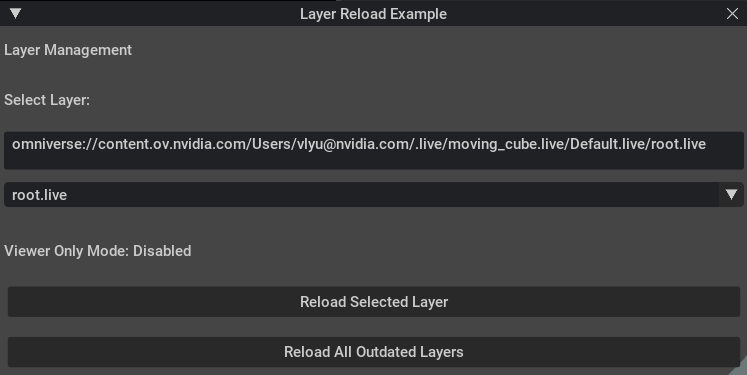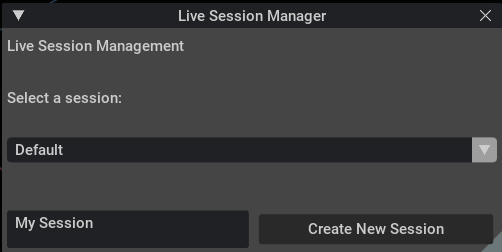Usage Examples#
Track Camera Followers with LiveSessionCameraFollowerList#
import omni.ui as ui
import omni.usd
from pxr import Sdf
from omni.kit.widget.live_session_management import LiveSessionCameraFollowerList
# Create a window to display camera followers
window = ui.Window("Camera Followers", width=400, height=200)
with window.frame:
with ui.VStack():
# Get the USD context
usd_context = omni.usd.get_context()
# Function to update the follower list when camera changes
def update_follower_list(camera_path_str):
# Clear previous content
content_frame.clear()
if camera_path_str:
camera_path = Sdf.Path(camera_path_str)
with content_frame:
# Create a camera follower list for the selected camera
follower_list = LiveSessionCameraFollowerList(
usd_context=usd_context,
camera_path=camera_path,
icon_size=24,
spacing=5,
maximum_users=5,
show_my_following_users=True
)
# Add the follower list layout to our content frame
if not follower_list.empty():
follower_list.layout.height = ui.Pixel(40)
else:
ui.Label("No followers for this camera")
# Create a combo box to select a camera
camera_paths = []
stage = usd_context.get_stage()
if stage:
# Find all cameras in the stage
cameras = [prim for prim in stage.TraverseAll() if prim.IsA('Camera')]
camera_paths = [str(camera.GetPath()) for camera in cameras]
ui.Label("Select Camera:")
camera_combo = ui.ComboBox(0, *camera_paths)
camera_combo.model.add_item_changed_fn(
lambda item_model, item: update_follower_list(camera_paths[item])
if item and item < len(camera_paths) else None
)
ui.Label("Users following the camera:")
# Content frame will contain the follower list
content_frame = ui.Frame(height=60)
# Initialize with the first camera if available
if camera_paths:
update_follower_list(camera_paths[0])
Screenshot:#

Reload Outdated Layers#
import omni.ui as ui
import omni.usd
from omni.kit.widget.live_session_management import reload_outdated_layers, is_viewer_only_mode
# Create a window with controls to reload layers
window = ui.Window("Layer Reload Example", width=600, height=300)
with window.frame:
with ui.VStack(spacing=10):
ui.Label("Layer Management")
# Get USD context and stage
usd_context = omni.usd.get_context()
stage = usd_context.get_stage()
if stage:
# Get all layers used in the stage
layers = stage.GetUsedLayers()
layer_paths = [layer.identifier for layer in layers]
# Create a combo box to select a layer
ui.Label("Select Layer:")
selected_layer = ui.StringField()
def set_selected_layer(model, item):
current_index = model.get_item_value_model().as_int
selected_layer.model.set_value(layer_paths[current_index])
layer_combo = ui.ComboBox(0, *[layer.identifier.split('/')[-1] for layer in layers])
layer_combo.model.add_item_changed_fn(set_selected_layer)
if layers:
selected_layer.model.set_value(layer_paths[0])
# Show viewer mode status
viewer_mode = is_viewer_only_mode()
ui.Label(f"Viewer Only Mode: {'Enabled' if viewer_mode else 'Disabled'}")
# Button to reload the selected layer
def reload_layer():
layer_path = selected_layer.model.get_value_as_string()
if layer_path:
reload_outdated_layers(layer_path, usd_context)
ui.Button("Reload Selected Layer", clicked_fn=reload_layer)
# Button to reload all outdated layers
def reload_all_outdated():
reload_outdated_layers(layer_paths, usd_context)
ui.Button("Reload All Outdated Layers", clicked_fn=reload_all_outdated)
Screenshot:#

Create and Manage Live Sessions with LiveSessionModel#
import omni.ui as ui
import omni.usd # Added missing import
import omni.kit.usd.layers as layers
from omni.kit.widget.live_session_management import LiveSessionModel
# Create a window with controls for managing live sessions
window = ui.Window("Live Session Manager", width=400, height=200)
with window.frame:
with ui.VStack(spacing=5):
ui.Label("Live Session Management", height=20)
# Get layers interface
layers_interface = layers.get_layers()
# Get the current stage's layer identifier
layer_identifier = omni.usd.get_context().get_stage_url()
# Create a LiveSessionModel for the current layer
session_model = LiveSessionModel(layers_interface,layer_identifier)
session_model.refresh_sessions(force=True)
# Create a combo box to select from available sessions
ui.Label("Select a session:")
session_combo = ui.ComboBox(session_model)
# Button to create a new session
with ui.HStack(height=30, spacing=5):
session_name = ui.StringField()
session_name.model.set_value("My Session")
def create_session():
# Generate a new session name if needed
if not session_name.model.get_value_as_string():
new_name = session_model.create_new_session_name()
session_name.model.set_value(new_name)
# Create the session using layers interface
live_syncing = layers_interface.get_live_syncing()
live_syncing.create_live_session(
name=session_name.model.get_value_as_string(),
layer_identifier=layer_identifier
)
ui.Button("Create New Session", clicked_fn=create_session)
Screenshot:#

Build User Icons with User Layout Utility#
import omni.ui as ui
import omni.kit.usd.layers as layers
from omni.kit.widget.live_session_management import build_live_session_user_layout
# Create a window to display custom user icons
window = ui.Window("User Icons Example", width=400, height=100)
with window.frame:
with ui.VStack():
ui.Label("Custom User Icons:")
with ui.HStack(height=50, spacing=10):
# Create a sample user object
# In a real scenario, this would come from a live session
class SampleUser:
def __init__(self, user_id, user_name, from_app):
self.user_id = user_id
self.user_name = user_name
self.from_app = from_app
# Adding user_color attribute required by the API
self.user_color = (0.2, 0.6, 0.8, 1.0) # Blue with alpha=1
# Create some sample users
users = [
SampleUser("user1", "John Doe", "Create"),
SampleUser("user2", "Jane Smith", "View"),
SampleUser("user3", "Bob Johnson", "Kit")
]
# Function to handle double-click on a user icon
def on_double_click(x, y, button, modifier, user):
print(f"Double-clicked on user: {user.user_name}")
# Function to handle single-click on a user icon
def on_click(x, y, button, modifier, user):
print(f"Clicked on user: {user.user_name}")
# Create user icons for each sample user
for user in users:
# Build a custom tooltip
tooltip = f"{user.user_name} ({user.from_app})"
# Build the user icon layout
user_layout = build_live_session_user_layout(
user_info=user,
size=32,
tooltip=tooltip,
on_double_click_fn=on_double_click,
on_mouse_click_fn=on_click
)
Screenshot:#
Display Live Session Users#
import omni.ui as ui
import omni.usd
from omni.kit.widget.live_session_management import LiveSessionUserList
# Create a window to display the live session user list
window = ui.Window("Live Session Users", width=400, height=100)
with window.frame:
with ui.VStack():
ui.Label("Users in the current live session:", height=20)
# Get the current USD context
usd_context = omni.usd.get_context()
# Get the base layer identifier (current stage URL)
base_layer_identifier = usd_context.get_stage_url()
# Create a user list widget with customized appearance
user_list = LiveSessionUserList(
usd_context=usd_context,
base_layer_identifier=base_layer_identifier,
follow_user_with_double_click=True,
icon_size=24,
spacing=5,
show_myself=True,
show_myself_to_leftmost=True
)
Screenshot:#
